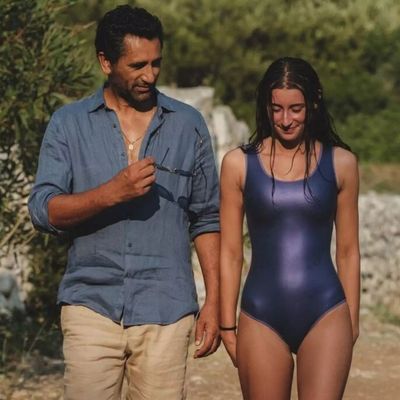
Coming-of-age films set at seaside locales are practically their own subgenre by now, but rarely are they as intoxicatingly present as Murina. Croatian director Antoneta Alamat Kusijanović’s debut feature (which won the Camera d’Or for Best First Film at Cannes last year) plunges us into the mind of a teenage girl struggling to free herself from her domineering father, and it does so by immersing us in the immediate physical world surrounding her. Among other things, it’s a movie about the lapping of waves on the shore, about the roar of boat engines, about the way the rocks and crags of the Dalmatian coast speak to the uncontainable restlessness of youth.
When we first meet Julija (Gracija Filipović), she and her father Ante (Leon Lučev) are out spearfishing morays (“murina”). The brash, impatient Ante thinks nothing of bellowing orders and pushing his daughter out of the way whenever he thinks she’s doing something wrong. His aggression can manifest as boisterousness or passion, and one can see how in small doses Ante might seem charming to outsiders. But for his family, living with him is more a reign of terror. Julija’s compliant, exhausted mother, Nela (Danica Curcic), desperately looks forward to the few moments when Ante might be in a good mood.
The daughter is the one doing the growing up here, but there’s something fundamentally childish about the father as well. As played by the veteran Croatian actor Lučev, Ante has nervous, hungry eyes and a predatory grimace. He’s a patriarch who rules over nothing, substituting rage for power – which effectively makes him a pathetic, overgrown infant. This man views everything as a dare: A reminder from his daughter that their boat once got destroyed when he tried to steer it between two large rocks is a challenge to attempt it again. Ante might consider this pride, but to everyone else, it feels like juvenile boastfulness. We’ve all known people like this, and one of the more heartbreaking facets of Murina is the deep chasm between the way Ante sees himself and the way he’s seen by those closest to him.
The father’s attitude naturally puts him on a crash course with his daughter, who has just begun to assert her independence. In sharp contrast to Lucev’s chatty, chest-thumping arrogance, Filipovic maintains a quiet, intense focus on everything around her — almost like a captive waiting for the right chance to escape. And the girl finds an opportunity with the arrival of Javier (Cliff Curtis), a gazillionaire family friend visiting for the first time in years, who comes with promises to help Julija get into Harvard, where he’s endowed a library.
Watching her parents with Javier, Julija glimpses paths not taken and lives left unlived. It’s clear that Javier was once in love with Nela, and that his friendship with Ante has had its share of strain over the years. Sensing this, Julija develops a closer relationship with Javier (even referring to him as her father at one point) while also trying to engineer a rekindling of his passion for her mother. In the girl’s mind, it shouldn’t take too much effort to escape with her mom and Javier to forge a new family, leaving Ante behind. It’s a child’s absurd fancy, to be sure, but within the heated immediacy of the movie, it makes some twisted emotional sense. Kusijanović conveys all this through the way her actors move against and look at one another. That’s filmmaking of the highest order — intimate and gripping.
For his part, Ante has a half-baked plan about convincing Javier to buy large blocks of land so they can open a resort for Italian tourists together — a resort where Julija will, of course, have to work eventually. “Dreams die in paradise,” the infinitely patient Javier tells Ante, trying to convince him to let the girl go abroad to study. That line could be the governing aesthetic of the film. The settings of Murina are certainly lovely, but Kusijanović avoids the siren call of the picturesque. The sea is steel blue, the terrain arid and lunar; the landscape has been stripped of possibility. Even the expertly-shot underwater sequences have a strange, surreal desolation to them; only those haunted, serpentine morays seem to exist in this barren blue world. (We see almost no other fish.) The daughter’s dreams cannot be contained by this spare coastline, while the father’s dreams have curdled here into empty grandiosity. The whole place is suffocated of life. And yet, somehow, the picture itself is wonderfully alive.
More Movie Reviews
- Fernanda Torres Is a Subtle Marvel in I’m Still Here
- Grand Theft Hamlet Is a Delightful Putting-on-a-Show Documentary
- Presence Is the Best Thing Steven Soderbergh’s Done in Ages


